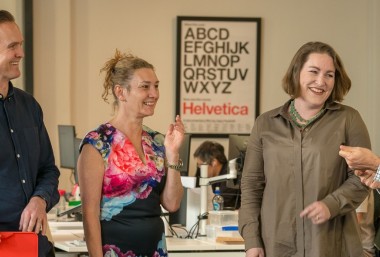Kiwi business Method Recycling is modernising office waste recycling systems with its stylish, highly visible and functional colour-coded bins.
Most of us do our bit for the environment by reducing, reusing and recycling. Sustainability certainly is a hot topic, but the actual collecting of waste and recycling items has always lacked aesthetic appeal. Until now.
Wellington company Method Recycling has transformed the humble waste bin into a thing of beauty. Its award-winning 60L Office Recycling Bins are designed like a piece of office furniture and provide an effective system for recycling in modern workplaces.
Drawing on their experience in product and graphic design, engineering and commercial leasing, husband-and-wife team Steven and India Korner set up Method in 2011. Steven had previously worked at Fisher & Paykel Healthcare on all aspects of product development and design. A graphic designer, India had expertise in commercial property and an understanding of office fit-outs.
'India and I always wanted to own a business together and design our own product,' says Steven. 'We’d identified office waste disposal and recycling as an area where we could make a big difference. It was an industry with no real design thinking associated with it, but it had a big role to play in sustainability and we saw a sweet spot where we could use our skills to make a difference.'
The couple bought a small business, travelled around New Zealand selling bins, liners and recycling labels, and learnt about the waste industry. They saw stylish modern offices with ugly recycling systems or bins hidden in cupboards. Employees lacked motivation to recycle, and companies didn’t see the value of a sustainable workplace.
In 2013, the couple started developing their freestanding Office Recycling Bin with colour-coded lids for different waste streams. They’d created the initial models at their kitchen table using cardboard, and had a Taiwanese company make prototypes.
'We shifted to an e-commerce model,' explains Steven. 'We went through a research phase, visiting companies to really understand how waste was working for them. We could see what they were doing, how they’d cobbled together solutions, the quality of product they were buying, and the problems they faced. With clear product design, we knew we could transform those experiences and make their recycling schemes really effective.'
They weren’t the only believers. Method subsequently sold out its first run of bins in pre-production. Among its initial customers were PWC, Z Energy, Trade Me, and the University of Auckland.
In mid-2015, tech giant Atlassian became Method’s first Australian customer, and the following year, Method became part of Lendlease’s 300,000m2 Barangaroo South carbon-positive development. The Sydney Cricket Ground became a customer in December 2016, a few months after Method introduced its products into Hong Kong and Singapore.
Focusing on a narrow product range is key to the company’s strategy. Method makes one size bin with two different lid options and a special Bag Retainer System designed to make the bin liners invisible. Based on customer feedback, it’s added its own bin liners, and makes Precyclers – desktop recycling accessories that provide short-term storage for waste and recycling.
Method started with a desire to make a visible difference. Now it exports 50% of its products and has sales offices in Wellington, Auckland, Sydney and Melbourne, with another opening soon in the UK. Over the past two years, the company’s seen a 600% increase in turnover.
While similar products exist, Method has captivated the design community with its beautiful and effective system. In 2015, it won two Designers Institute of New Zealand ‘Best Design’ Awards. In February 2018, Method sent 1000 recycling bins to a thought-leading facility in New York City. The following month, it filled an order to world-renowned architecture firm Foster & Partners in London.
Protecting its intellectual property has been a vital step for Method. The founders secured some early patents, design and trade mark registrations through a small IP specialist, but in early 2017, they approached AJ Park for more wide-ranging advice.
AJ Park principal Mark Hargreaves initially helped with the company’s IP strategy, and Michael Brown worked on its patented Bag Retainer System. Method also works with trade mark specialist Corinne Cole.

From left to right: Steven Korner, Co-founder and CEO of Method Recycling, Corinne Cole, Principal of AJ Park, India Korner, Co-founder of Method Recycling, Mark Hargreaves, Principal of AJ Park
'Method originally came to us to undertake the Innovation IP®, which is part-funded by Callaghan Innovation,' says Mark Hargreaves. 'We ran our programme with Method, getting to know their business and their technology and working with them to understand and develop their IP strategy. Since then, we’ve helped with their branding strategy and protection and we’re working on options for protecting their product features and upcoming innovations.'
Steven says once they saw how well Method was doing overseas, they sought to fine-tune their IP protection. The company now has patent and trade mark protection for its systems in New Zealand, Australia, the UK and Europe, with some design-related elements protected in the US.
'It was important to protect our brand,' says Steven. 'We didn’t want people to rip off our brand because we’ve put a huge amount of effort and thought into that.'
AJ Park has really helped us understand how to navigate our IP internationally, particularly going through the Madrid Protocol process and how that feeds into a greater strategy of protecting our brand internationally. They add value to our product roadmap through strategies to ensure we have IP protection for the ideas we’re working on now and into the future.
Mark believes Method has a very bright future, and the clear values behind their products and brands are what make them special.
'They have unique and clever designs and their brand is key to setting them apart. They’ve taken a fairly unloved product category and turned it into something more worthy of product design, branding and IP development. Steven and India are looking to change the way people think about bins and recycling and use their products to drive better behaviours and make an environmental impact.'
That impact can be measured in the sustainability results from some of Method’s customers, who have seen an increase from 60% to 88% diversion from landfill just through using Method Recycling Bins.
Written by: Deirdre Coleman
Photo credit: Shaun Lee

